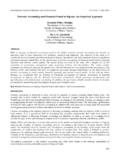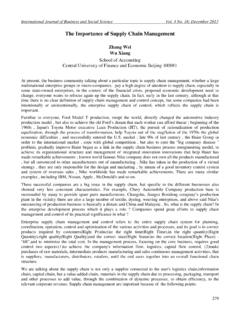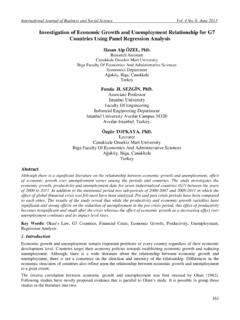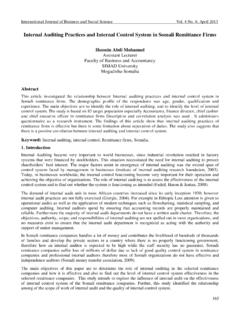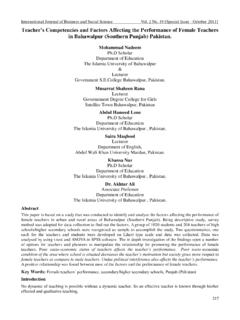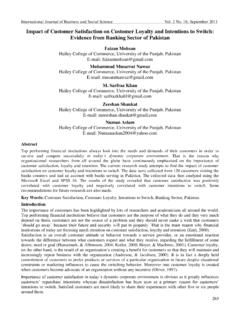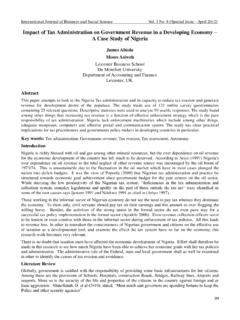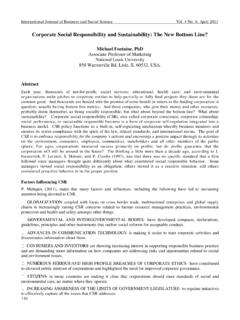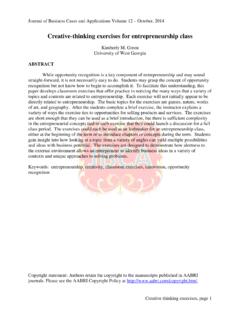Transcription of Entrepreneurship, National Culture and Turkey
1 International Journal of Business and Social Science Vol. 2 No. 16; September 2011 146 entrepreneurship , National Culture and Turkey Osman ERO LU Lecturer Dicle University Faculty of Economics and Administrative Sciences Department of Management and Organization Diyarbak r, Turkey E-mail: Phone: +90 412 2488347 Murat PI AK Assistant Professor Dicle University Faculty of Economics and Administrative Sciences Department of Economics Diyarbak r, Turkey E-mail: Phone: +90 412 2488347 Abstract Even though entrepreneurs in different countries share some universal traits, they may also have other traits that are specific to their own National Culture .
2 entrepreneurship behaviour is respectively linked to cultural values, and this association is based on the framework of Hofstede s cultural dimensions. Studies indicate that National Culture plays an essential impact on entrepreneurship . This study is based on how National Culture is related to levels of entrepreneurship with emphasis on Turkish Culture and its relations with entrepreneurship . Key words: entrepreneurship , National Culture , Hofstede s Cultural Dimensions, Turkey . 1. Definitions of entrepreneurship entrepreneurship , according to Onuoha (2007), is the practice of starting new organizations or revitalizing mature organizations, particularly new businesses generally in response to identified opportunities.
3 Schumpeter (1965) defined entrepreneurs as individuals who exploit market opportunity through technical and/or organizational innovation . For Frank H. Knight (1921) and Peter Drucker (1970) entrepreneurship is about taking risk . Bolton and Thompson (2000) have defined an entrepreneur as a person who habitually creates and innovates to build something of recognized value around perceived opportunities . Hisrich (1990) defined that an entrepreneur is characterized as someone who demonstrates initiative and creative thinking, is able to organize social and economic mechanisms to turn resources and situations to practical account, and accepts risk and failure.
4 Thomas and Mueller (2000) argue that the study of entrepreneurship should be expanded to international markets to investigate the conditions and characteristics that encourage entrepreneurial activity in various countries and regions. It is reasonable to expect that entrepreneurs reflect the dominant values of his or her National Culture and National Culture has definite effect on entrepreneurship (Thomas & Mueller, 2000). 2. National Culture National Culture has earlier been defined by many scholars. Culture is defined as a set of shared beliefs, values and expected behaviours (Herbig, 1994; Hofstede, 1980a).
5 Deeply embedded, unconscious, and even irrational shared values shape political institutions as well as social and technical systems, all of which simultaneously reflect and reinforce values and beliefs. Cultural values indicate the degree to which a society considers entrepreneurial behaviours, such as risk taking and independent thinking, to be desirable. Cultures that value and reward such behaviour promote a propensity to develop and introduce radical innovation, whereas cultures that reinforce conformity, group interests, and control over the future are not likely to show risk-taking and entrepreneurial behaviour (Herbig & Miller, 1992; Herbig, 1994; Hofstede, 1980a).
6 Culture consists in patterned ways of thinking, feeling and reacting, acquired and transmitted mainly by symbols, constituting the distinctive achievements of human groups, including their embodiments in artifacts; the essential core of Culture consists of traditional ( historically derived and selected) ideas and especially their attached values (Kluckhohn, 1951). International Journal of Business and Social Science Vol. 2 No. 16; September 2011 147 Kroeber and Parsons (1958) arrived at a cross-disciplinary definition of cultures as transmitted and created content and patterns of values, ideas and other symbolic-meaningful systems as factors in the shaping of human behaviour and the artifacts produced through behaviour.
7 Researchers have explored the effect of National Culture on risk taking, innovation and entrepreneurship . In this study, we will try to explore the effect of National Culture on entrepreneurship . 3. entrepreneurship and National Culture Although entrepreneurs in different countries usually share some universal traits, they may also have other traits that are specific to their own Culture . For example, entrepreneurial activity is encouraged as an avenue to stimulating economic growth and empowering marginalized segments of population in less-developed countries (Yasin, 1996). Therefore, there is no dominant theory that entrepreneurship is universal and a good entrepreneurship theory in a country will also be good in another country.
8 The purpose of this study is to indicate that there is an absolute effect of Culture on entrepreneurship , and entrepreneur reflects dominant values of his or her National Culture ; therefore, some countries entrepreneurship is lower compared to other countries. Weber (1956) pointed that entrepreneurship behaviour might be linked to cultural values and suggested that values and beliefs are factors that encourage entrepreneurship . Based on the framework of Hofstede (1984), it is concluded that individualistic Culture emphasizes the values of personnel initiative and achievement, while collectivistic favour group decisions.
9 McGrath (1992) found that entrepreneurs across several cultures share a set of values such as collectivism and some entrepreneurial beliefs that are independent of their Culture . 4. Hofstede s Cultural Dimensions and entrepreneurship entrepreneurship behaviour is respectively linked to cultural values, and this association is based on the framework of Hofstede s cultural dimensions. Shane (1993) investigated the association between four of Hofstede (1980 a, b) dimensions described previously and the National rates of innovation in 1975 and 1980. Shane found that uncertainty avoidance was negatively associated with innovation in both time of periods.
10 Similarly, power distance was found to be negatively associated with innovation for the earlier period but not the later one, yet masculinity had no significant association with innovation at the National level. These results indicate that the association between specific cultural dimensions (as captured by Hofstede) is not temporally stable, yet are essential to entrepreneurship . The preceeding discussion shows that some evidence exists that broad cultural characteristics are associated with National levels of entrepreneurship . Specifically, high individualism, low uncertainty avoidance and high power-distance have all been found to be associated with National rates of innovation.
